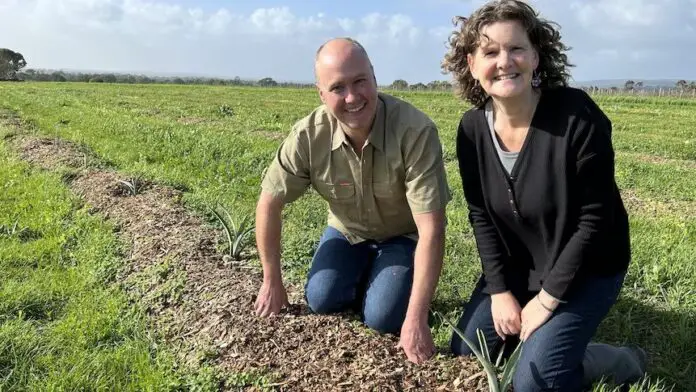A section of land once used to grow wine grapes in South Australia’s McLaren Vale region has been transformed into a commercial agave tequilana plantation, marking the state’s first venture into this emerging crop.
Oli and Tara Madgett, local grape growers, have diversified their operations by planting agave tequilana alongside malting barley on their property. The decision to transition from wine grapes was prompted by economic challenges in the industry, with the couple facing difficulties in making a profit over the past decade.
The Madgetts’ joint venture with plant-based technology group Vircura aims to produce an agave spirit, which will be marketed under a different name due to regional restrictions on calling it “tequila.” The project has sparked excitement among experts, who believe that agave holds significant potential for Australian growers seeking diversification.
Agave’s Promising Future
Rachel Burton, chief scientific officer at Vircura and an expert in emerging crops, highlights the versatility of agave tequilana. This succulent plant is adaptable, resistant to frost, and has multiple uses beyond becoming a spirit:
– It can be harvested for sugar production, which can be converted into ethanol or bio-ethanol for sustainable aviation fuel.
– The fibres from agave plants can be used in building materials.
– Agave has natural fire-resistant properties, making it an attractive option as a natural fence.
– Livestock can graze on the plant.
Challenges Ahead
While Queensland has ideal conditions for growing agave, prospective growers in South Australia must contend with frost risk and limited rainfall. Burton cautions that frost-tolerant lines will be essential for success in the region. The plants have already faced early winter frosts, which may impact their growth.
A World-First Experiment
The Madgetts’ and Vircura’s agave tequilana plantation is a pioneering effort, as they attempt to cultivate this crop in South Australia’s Mediterranean climate. Within four years, the plants could be ready for spirit production, pending successful adaptation to local conditions.
Burton expresses her enthusiasm for agave’s potential, citing its multiple uses and resilience: “Everybody thinks I’m a nutter because I’ve been raving on about agave for years… finally seeing it in the ground is very exciting.”
Source: ABC.net






